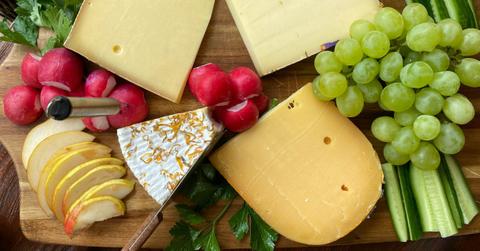Study Says Bird Flu May Be Able To Survive in Some Types of Cheeses
It seems like this effects cheeses made with raw milk.
Updated Oct. 27 2025, 1:14 p.m. ET

At the start of 2025, you couldn't turn on the news without seeing coverage of how the bird flu virus was impacting the price of everything from eggs to milk, as farmers worked to take care of their flocks ahead of what was predicted to be a massive outbreak among livestock.
And while it looks like the agricultural sector was able to mostly manage the bird flu epidemic, there may be a new area shoppers feel the pinch when it comes to the grocery store, and yes, it's still in the dairy aisle.
A study completed by Cornell University researchers says that the bird flu virus has been found in certain cheeses, likely due to the way that some ingredients are processed.
That means that there could be some changes coming to your favorite cheese option as manufacturers work to tweak processing or adjust ingredients to keep cheese safe without sacrificing flavor in the process. Curious to know if your favorite cheese is on the list of varieties to test positive? Keep reading to learn more.

The bird flu virus has been found in certain cheeses.
Cornell University released a study that says that certain cheeses tested positive for infectious versions of the bird flu virus, even after 60 days of aging. The findings were published on Oct. 8, 2025, in the Nature Medicine journal.
According to researchers, the virus was able to survive for months in cheeses that were made using raw milk, an ingredient that doesn't undergo the heating process known as pasteurization. Typically, manufacturers make these cheeses safe using an aging process.
However, the study found that the virus could outlast the aging process, especially in cheeses that had a lower pH level. They found that cheeses with a pH of 5 or below — like Feta, which has a pH of around 5.4, according to Newsweek — were less likely to test positive for the virus.
But, the good news is that this doesn't mean that you'll have to stop eating your favorite low acid cheeses.

Researchers say that additional steps can be taken to help kill off the virus in cheeses, including sub-pasteurization (which Newsweek says involves heating milk just enough to kill the virus but not enough to impact the taste or texture of the cheese), or even testing the milk (a process that was stopped in May 2025) before it's used in the cheese making process.
What food contains bird flu?
Bird flu has been found in everything from beef to cat food, which is why it's important to follow food safety guidelines when eating food.
For example, the U.S. Centers for Disease Control and Prevention (CDC) says that chicken and eggs should be cooked to a minimum temperature of 165˚F, and beef should be cooked to at least 145˚F. Additionally, they suggest avoiding raw milk, both as a beverage and when used as an ingredient in other foods, due to the risk of bacterial and viral growth.